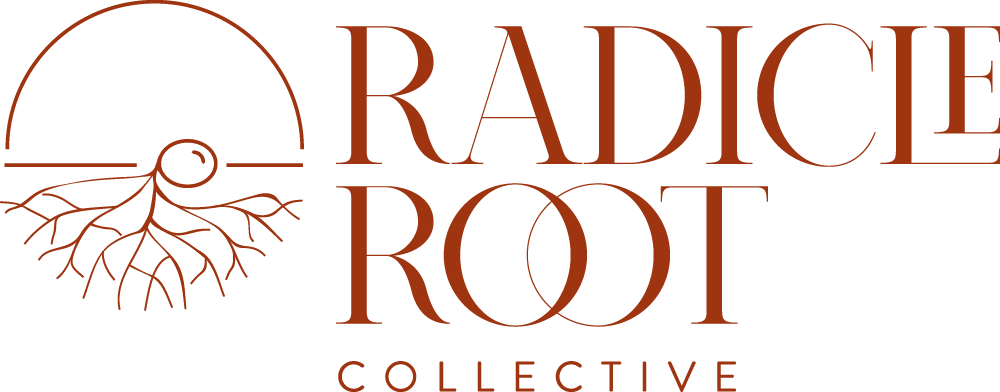It’s Our Birthday!
Co-Founder Jo Brownson shares Radicle Reflections on 4 years of collective transformation and racial healing in this special community. As we enter a new season together, we invite you, our community, to wander through these questions with us.
“Healing is an act of communion”
Since establishing a community of facilitators, coaches and consultants called Radicle Root Collective, Taquelia and I have spiraled up and down and around the elusive set of words that could best describe “what we do” and “who we are.” Are we diversity, equity and inclusion professionals? We know we work in the “diversity, equity and inclusion” field, but we never use that term to describe our work except to say that we exist to reimagine and expand traditional DEI. Are we organizational consultants? We know we work with organizations, but we do not take the linear approach to change that is typical in traditional organizational consulting. We do not approach organizations as machines, but rather as living, breathing, interdependent ecosystems. Are we healers? Exhale. Yes. Can we stop here? Do we need more words?
There has only ever been one uncomplicated answer to the question of whether or not healing is who we are and what we are about. It is why the first learning series we created in the very early days of RRC was a Racial Trauma and Healing series we offered to a national network of family violence prevention professionals and service providers in 2019. It is why our first task as co-directors was to develop RRC’s definition of racial healing. It has been at the center of the what and the who of RRC since that first seedling sprung forth inside of my and Taquelia’s imaginations.
But, why healing? RRC’s work is rooted in a belief that all the -isms that traditional DEI seeks to address have common roots. These roots are not individual acts of hate, bias or prejudice. They are systemic, structural and cultural. White supremacy, patriarchy and capitalism are forces of separation and disconnection - with the land and our beyond human kin, with our wholeness, with our magic, with our memory, and with our interdependence.
The impact of this separation, whether slow or fast, is visceral - it lands on and inside of our bodies. As Ta-Nehisi Coates reminds us, racism “dislodges brains, blocks airways, rips muscle, extracts organs, cracks bones, breaks teeth.” We are inundated with the horrific violence of these interlocking systems in the here and now - from Sonya Massey’s murder at the hands of police in Illinois, to the colonial and genocidal violence against Palestinian bodies and land that our government is funding, to the extraction of minerals and labor from the land and human bodies in Congo to enrich billionaires. The scale and intensity of the pain and trauma caused by these systems should break our hearts and take our breath away.
Yet, in all the emails, spreadsheets, strategic plans, powerpoints, stress-filled meetings, crisis management and unilateral decision-making our partners engage in, we see how easy it is to move as if we are machines, devoid of emotions, rather than organic matter carrying around the encoded rage, love, resilience, wisdom, trauma and joy of our ancestors in our tissues.
Just as trees possess the brilliant capacity to transform carbon dioxide into oxygen, and mycelium transforms organic waste into rich soil, our bodies are capable of taking in and metabolizing grief, suffering and pain into the energy we need to transform ourselves and our world. But we are not meant to do this kind of healing alone. RRC believes that when we come together in any formation - family, organization, community - it is possible to recover this capacity to feel more, to transform (it is within us!) and to act in more alignment with what we say we value. Together, in communion. This is why we are healers.
And, yet. How to be healers in the field of DEI and the world of organizational consulting is a question that can so easily lead us into a wilderness of words. How do we bring healing to the inside of organizational cultures when societal culture insists that healing is meant to be done in private and at the individual level, or not done at all? How do we support organizations to move at the pace of healing and transformation when the pace of destruction and disconnection can feel so fast? How are we stewarding RRC's resources in a way that honors our limits AND our role as healers in a larger ecosystem of racial and economic justice work?
While there are so many more thoughts, feelings, reflections, poetry, songs, and folklore that we want to share with you, dear friends, it is time to pause. We look forward to being in community, conversation, and reimagination with you as we wander with these questions into our next year of life as RRC. Please wander with us.

